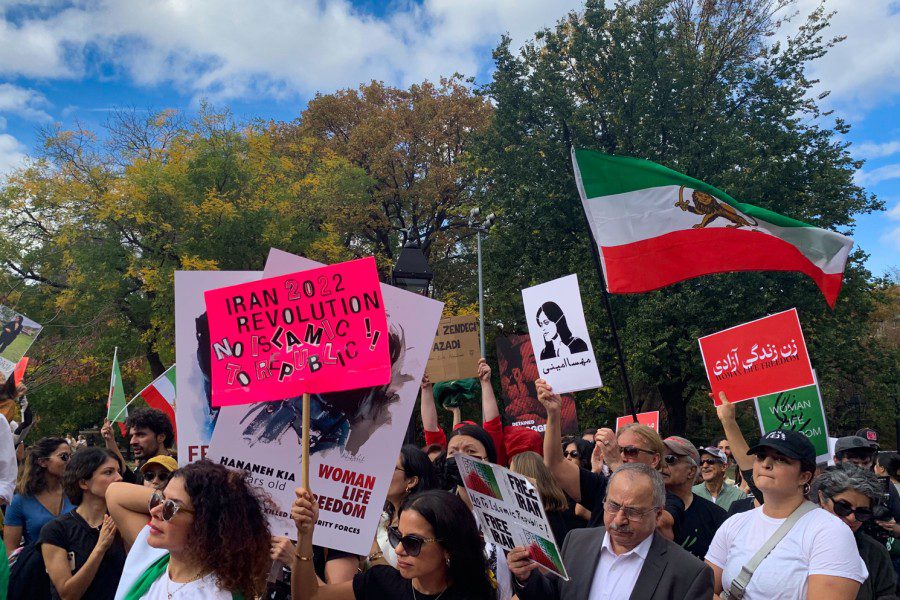Opinion: Islam didn’t start the Iranian protests
While there has been widespread support for Iranian women’s rights, the media has misinterpreted the true intentions of these protests.
File photo: protestors against the Iranian government at Washington Square Park on Nov. 5 2022 (Carmo Moniz for WSN)
November 21, 2022
Following the murder of Mahsa Amini, protests rapidly spread across the globe from Washington Square Park to London. The attention that Iranian women have received in the media is remarkable — there’s no doubt about that. My Instagram feed has been flooded with NYU students constantly posting information on the current events of Iran. Everyone is making sure they are a part of this movement for women’s freedom.
However, as a Muslim woman who personally chose to wear a hijab in public, I am a little confused about one thing. The media is suggesting that the primary intention of these protests is to speak out against the so-called religious control of Islam. There is an implication that Iranian women are rejecting the hijab and Islam.
The media is missing the point, though — this isn’t entirely about the hijab. Yes, the hijab is related to Mahsa’s murder, but there has been a long and complicated history of political change in Iran since the early 1900s. The Islamic Republic of Iran has been controlling women’s bodies and their rights on education, autonomy and marriage for decades.
The protests in Iran aren’t promoting the eradication of Islam or Muslim women from wearing the hijab. Iranian women are responding to the years of misogynistic principles and laws that have restricted their rights to live freely. They are fighting for autonomy in all aspects.
It also hurts that the media does not always consider fighting for the right to continue wearing a headscarf as women’s autonomy.
“It is misogynistic and hateful to force women to remove hijab — as much as it is misogynistic and hateful to force women to wear hijab,” opinion columnist Shaista Aziz wrote for CNN.
Islam does not force its principles on Muslims. While it is required for Muslim women to cover their hair, we still have a right to decide whether we want to or not. Wearing a headscarf in public — especially while living in a Western society — is literally exposing your identity for everyone to see. It’s difficult to constantly be in such a position, and some women aren’t comfortable doing so. Society and the government have no right to dictate the intentions and consequences of how you dress.
If Islam forcibly pressures all practicing women to cover, as a lot of media coverage claims, then my non-hijabi Muslim friends and colleagues deserve to be punished in some way. They would be judged on that choice alone, and none of their actions regarding humanitarian, religious and academic pursuits would matter. How is that fair?
I have tried to explain my opinion on Iran to some classmates, but the conversations have always been cut short. It doesn’t seem fit to even bring it up to them. I am not Iranian, but I am Middle Eastern. I also do not live in a society which forces me to wear or remove my hijab. I know of Muslim women who don’t cover their hair.
If hijab is universally perceived as a sign of oppression, what does that say about me? If I publicly choose to cover my hair while attending NYU, how is Islam directly restricting my decision? Is my hijab still a call for help?
It’s not always easy wearing a hijab in public. Despite this, I made a conscious decision to present myself to the world with a hijab — if you don’t agree with my decision, that doesn’t make me wrong. It’s simply my choice. I grew up in an environment where the hijabi women around me were role models in life. Other people might not have the same relationship with Islam or the hijab as I do, but I made a choice due to positive and subtle influences. I was not forced to comply with rules out of fear of getting hurt.
I know I can’t cover every aspect of Iranian politics and the rights of Muslim women — it’s an extremely dense and rich topic. Nonetheless, while the support for Iranian women is both powerful and outstanding, the media should not misconstrue the meaning behind hijab and mistake these protests’ purpose as denouncing Islam. Iranian women are responding to how the government has abused them through a constricting distortion of Islam. While the enforcement of hijab in Iran is an oppressive act of control, hijab itself is not a universal sign of oppression for all Muslim women who choose to cover their hair.
Let us not take the media at face value when there is a much deeper history of what is actually going on. These protests are about women’s rights. They’re about the freedom for all women to choose to do what they want — whether it be wearing a hijab, not wearing a hijab, starting a business, going to college, or getting a divorce. These women are striving to accomplish the same goal: autonomy.
WSN’s Opinion section strives to publish ideas worth discussing. The views presented in the Opinion section are solely the views of the writer.
Contact Afnan Abbassi at [email protected].
























































































































































